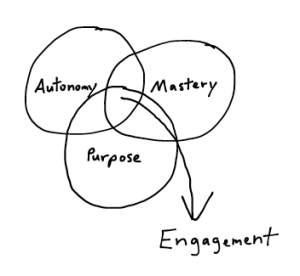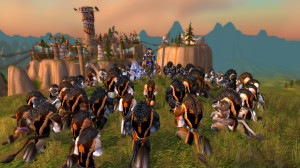Empowering Mastery: the golden key to sustained engagement

In a few short weeks, we’ll make our annual pilgrimage to CAZ – aka Cazadero Family Performing Arts Camp . We’ll camp among the redwoods, play music in the open air, line up at the dining hall for delicious organic meals, and connect with other musical/artsy families. For us, it’s heaven – the place that brings out our best selves.
Character Transformation is Compelling
One of the many things I love about CAZ is watching kids grow into young adults – and campers grow into staffers. At CAZ, mastery opens up new opportunitiess for leadership and impact. My friend Sarah, for example, started as a camper and fellow Mom. Now she teaches a popular mosaic arts class.
Like all well-run summer camps, there are many ways to “go behind the curtain” and contribute to creating the camp experience. At CAZ, campers who have a musical or artistic gift – like Sarah – often morph into teachers, staff and volunteers. Last year, after attending for 6 years, I had my musical level-up moment; my Jazz Ensemble teacher, Larry, asked me to “sit in” on his morning Hip Hop class to provide a steady, strong beat. I was happy to do it – ’cause it meant he was bringing me behind the curtain, and counting on me as a fellow musician.
For those who’ve earned it, there’s nothing more motivating than a new, challenging role to play.
Mastery is Intrinsically Motivating

Mastery is the often-overlooked and misunderstood stage of the Player Journey. To master something, you need to learn, practice, and build up your skills and competence. Mastery involves effort and self-transformation; that’s what makes it compelling and meaningful.
We know from Self-Determination Theory (and our own experience) that competence and mastery are deeply, intrinsically rewarding. We also know that games can tap into our deep desire to FEEL ourselves getting better at something. Games give us a restricted playground – a microworld – where we can immerse ourselves, learn the boundaries, master the rules and visibly improve our skills.
A good game has the power to make us feel smart and competent, even when our world is falling apart. In contrast to the ups and downs of real life, the right game can reliably reward us for focused effort.
Mastery > Progress
 Many non-game designers understand this basic idea – and eagerly adopt points, badges, leaderboards, and ratings systems to track and reward progress. They soon learn what every game designer knows: numbers alone don’t confer meaning. You need context, challenge and personal transformation to create an compelling, effective Mastery system.
Many non-game designers understand this basic idea – and eagerly adopt points, badges, leaderboards, and ratings systems to track and reward progress. They soon learn what every game designer knows: numbers alone don’t confer meaning. You need context, challenge and personal transformation to create an compelling, effective Mastery system.
Consider World of Warcraft (WOW) a 10-year-old MMO that brought in over $1B in revenue last year. The motivational power of WOW’s progression system isn’t embodied in the points, levels and milestones; those are scaffolding, like the framing of a house. WOW is compelling because of the story you tell yourself – and the skills and relationships you develop – and you gain new powers and take on new roles and challenges in Azeroth.
For those who’ve earned it, there’s nothing more motivating – and more character-revealing – than a new, challenging role to play.
Enter the Elder Game
Due to the nature of their work, game designers have evolved many different ways to keep players engaged for extended periods of time. One familiar tactic is replayability. Well-designed board games like Go, Chess, Checkers, Settlers of Catan, D&D, and even CandyLand are crafted to be highly replayable. The game has a clear ending and outcome – and often comes with the mutual expectation that there’ll be a friendly re-match in the near future
Contrast that with online social gameworlds like MMOs, where there’s no “game over” moment – the game continues as long as the player remains entertained and engaged. To keep their most dedicated players happy, MMOs evolved the concept of an Elder Game specifically for players who have “mastered the grind” AKA the core habit loop, and now find that levelling up is no longer a compelling goal.
Your Best Players Want Challenge and Impact
In sports, gaming, politics, or any passionate hobby, dedicated players need new goals and challenges to keep them fully engaged. In a skill-based activity, the player’s abilities are transformed over time. If you can figure out how to unlock new opportunities to leverage those abilities, you’ll have a powerful tool for keeping your most passionate customers engaged.
In my next post, we’ll dive deeper into Elder Game design, and learn 5 power-tips for designing an engaging, high-leverage role for your most dedicated players.
From the Archives: Empowering Mastery from Amy Jo Kim | Full Circle Associates
March 25, 2022 @ 6:12 am
[…] archives that is still 100% fresh and useful today. I used to follow the posts of game mastermind, Amy Jo Kim. I always found something to inspire me, or even more satisfying, apply in my practice. And I […]